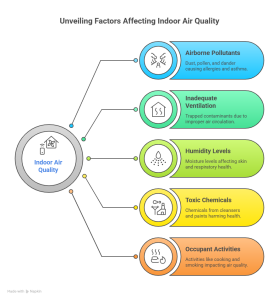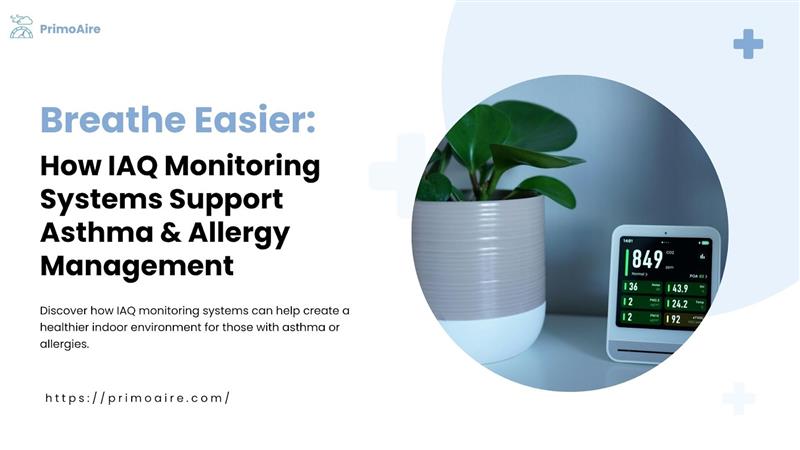As per the Asthma and Allergy Foundation of America, more than 28 million people in the U.S. have asthma. This translates to approximately 1 in 12 people. Poor indoor air quality is a major cause of asthma attacks and allergy flare-ups. Common indoor pollutants, such as dust, mold, pet dander, and chemicals, can exacerbate symptoms.
Since people spend most of their time indoors, clean air is essential. An indoor air quality monitoring device can help you by tracking these pollutants in real time. But do they really make a difference in managing respiratory conditions? Read on to know more in detail!
How does the Indoor Environment Affect Respiratory Conditions?
The quality of air in your home, schools, offices, and other indoor environments can be unhealthy. Individuals who spend their days indoors are more likely to contract respiratory illnesses. So, wearing a mask is not enough; you need an indoor air quality monitor for home to filter the air inside.

But first, we need to determine which factors affect IAQ.
- Airborne Pollutants
Daily exposure to indoor pollutants can have a gradual and often invisible impact on your health. These remain in the air, causing allergies or asthma, and they are dust, pollen, and pet dander.
- Inadequate Ventilation
With improper air circulation, indoor contaminants remain trapped in place. When there is no fresh air, your house may become stuffy and unhealthy.
- Humidity Levels
The indoor air quality meters measures the frequent moisture in the air. A lack of moisture may cause your skin and breathing cavity to dry out. Moderate humidity also helps maintain a comfortable temperature in the home and within the body.
- Toxic Chemicals
Many cleansers, paints, and materials release toxic chemicals into the air. You may experience the long-term effects of these hidden toxins on your breathing and overall health.
- Occupant Activities
Indoor pollutants can have harmful effects, particularly from activities such as cooking, smoking, or burning candles. These daily practices can have a significant impact on air quality and your health.
What Is IAQ and Why Does It Matter for Health?
The U.S. EPA (Environmental Protection Agency) states that IAQ refers to the indoor air quality that relates to the health and comfort of individuals residing in a building.
- Poor IAQ can worsen respiratory illnesses like asthma, bronchitis, and COPD.
- According to studies, air pollution is associated with an increased risk of cardiovascular disease.
- Cognitive impairment due to indoor pollutants, like nitrogen dioxide and carbon monoxide
- Indoor allergens, such as dust mites, mold, and pet dander, can trigger allergic reactions and asthma attacks.
Can Monitoring Indoor Air Quality Help Manage Asthma or Allergies?
The short answer to the question is yes. Monitoring indoor air can be a valuable tool in controlling asthma and allergies. For this, you can use our Home Air Quality Monitor. Our smart device detects problems and fixes them. To learn more about what our air quality monitor measures, click here.
Let’s check out how an air quality monitoring device helps:
- Identifies Frequent Triggers
Specifically, IAQ monitors can identify allergens and irritants in the air, such as dust, pollen, mold spores, pet dander, and VOCs. All these trigger asthma or allergies.
- Provides Real-Time Alerts
Several smart monitors or air quality devices for homes send instant notifications in the event of deteriorating air quality. That enables you to react promptly.
- Monitors Long-Term Trends
IAQ data collected over a period helps identify long-term trends, such as seasonal triggers of IAQ or the impact of cleaning products. That you can make informed lifestyle changes.
- Enhances Household Comfort
The problematic areas (such as the lack of proper air ventilation in the rooms or the high-humidity points) can be revealed by the IAQ systems and by tracking the indoor air quality.
Are IAQ Monitors Worth It for Allergy or Asthma Sufferers?
Individuals suffering from asthma or allergies should install IAQ (Indoor Air Quality) monitors. The air quality products are perfect and worth it to detect harmful airborne particles and all common triggers for symptoms. These include:
- dust
- pollen
- pet dander
- mold spores
- volatile organic compounds (VOCs)
Final Thoughts
Overall, if you or someone in your family struggles with asthma or allergies, keeping indoor air clean is more than just a nice idea; it’s essential. IAQ (Indoor Air Quality) monitors can help by tracking indoor air pollutants in real time, so you can take action before symptoms start. They also help spot patterns and problem areas in your home, making it easier to breathe more easily every day.
Since we spend most of our time indoors, why not make that air as healthy as possible? Don’t delay, check out our air quality monitoring device and see how it makes a real difference.


